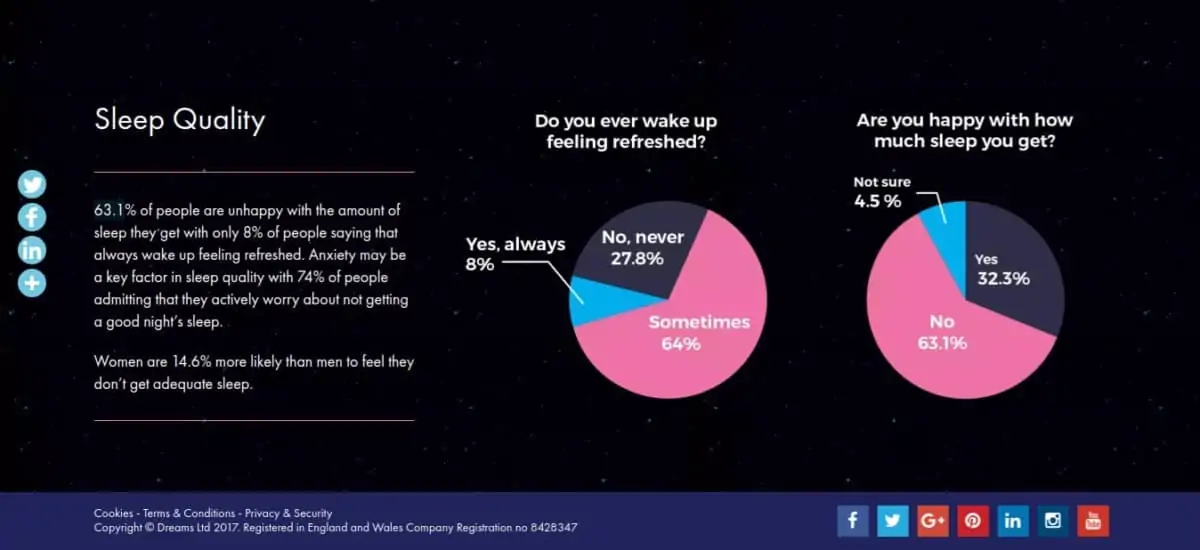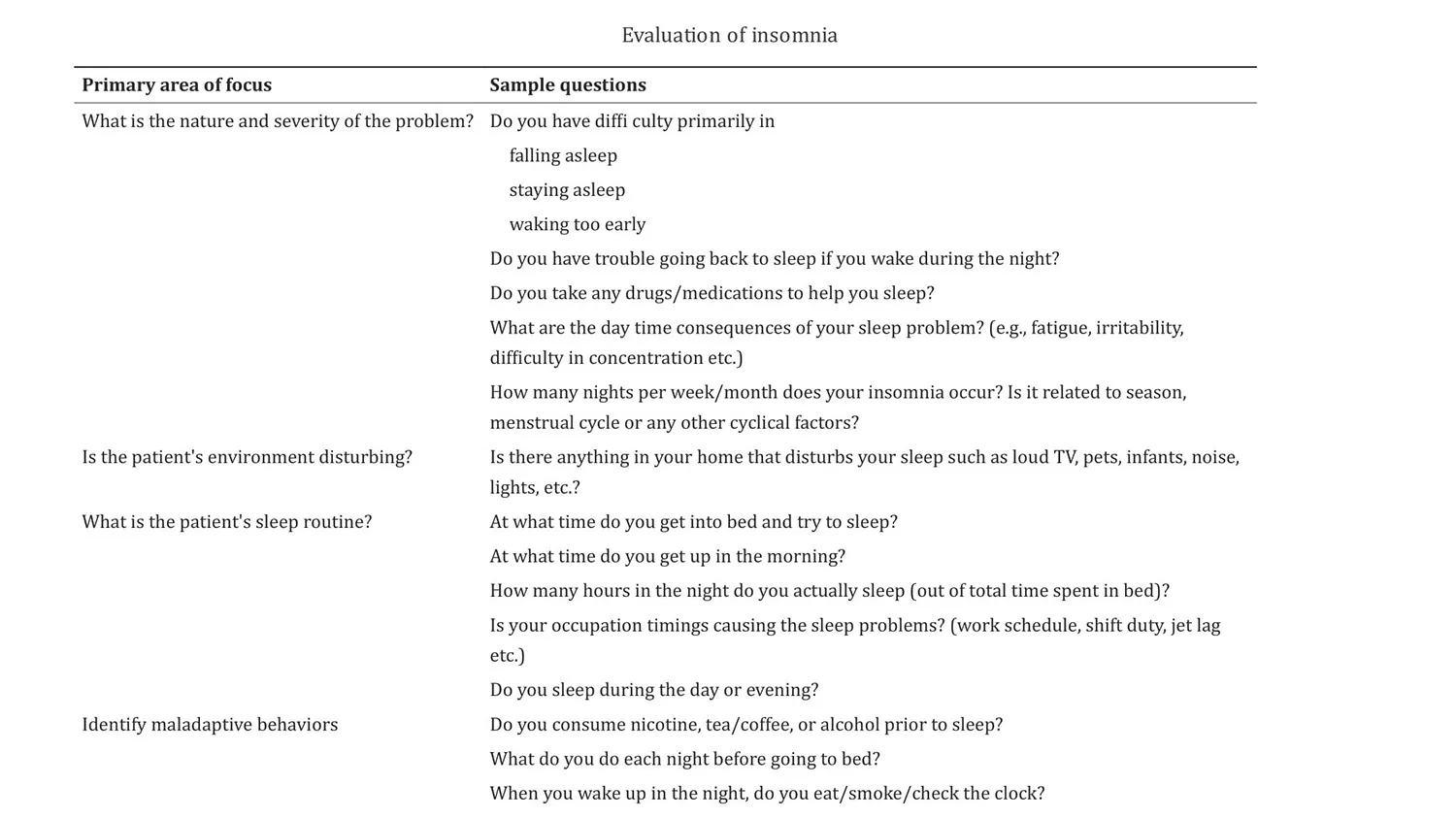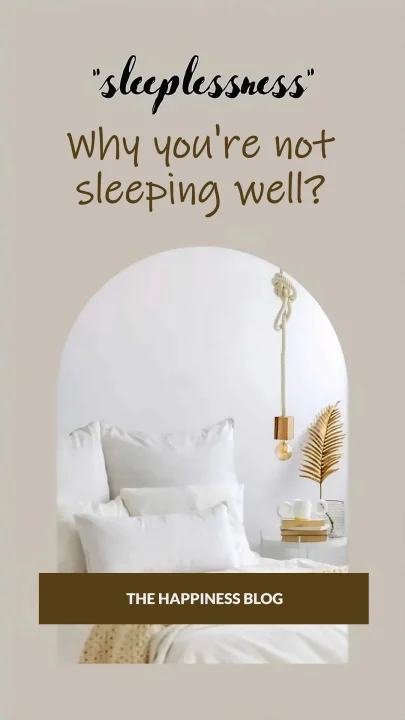Today's Thursday • 5 mins read
You slept for eight hours, but you didn’t feel refreshed when you woke up. That counts as sleeplessness, or insomnia.
Insomnia is not getting enough sleep or good-quality sleep, despite having the time and place to sleep. Sometimes, it could be a silent cause of daytime irritability or lack of focus.
How common is insomnia? Global Insomnia Statistics reveal:
- 22% of US adults report difficulty falling asleep every night.
- 36% have trouble falling asleep at least once a week.
- 50% experience insomnia at least once a month.
“Sleep debt” is the difference between how much sleep you need and how much sleep you get.
Sleeping longer on the weekends doesn’t pay off the sleep debt you take out during weeknights of social media scrolling. You’ll pay for it when you get older.
Insomnia is more common in women and older adults, and in divorced or widowed people.
Let’s look at the causes, symptoms, and treatment of insomnia.
Symptoms of Insomnia
Insomnia is marked by one or more of the following symptoms, which occur despite having adequate opportunities for sleep:
- Difficulty initiating sleep (trouble falling asleep while in bed)
- Waking up too early and then being unable to return to sleep
- Difficulty maintaining sleep (waking too often or having trouble going back to sleep)
- Non‑restorative or unrefreshing sleep (feeling tired after adequate hours of sleeping)
- Daytime distress (feeling tired, sluggish, or irritable during the day)
If these happen at least 3 nights a week for 3 months or more, it’s called chronic insomnia.
Causes of Insomnia
Psychological and Behavioral Causes
- Overthinking or rumination
- Stress, anxiety, and depression
- Mental trauma and emotional distress
- Poor sleep habits, such as irregular bedtime
Physical Causes
- Heart problems, thyroid disorders, or arthritis pain
- Neurological conditions like Parkinson’s and Alzheimer’s
- Asthma, allergies, or chronic obstructive pulmonary disease (COPD)
- Acid reflux, urinary issues, or menopause
Modern Lifestyle
- Exposure to artificial and digital blue light delays natural sleep cycles.
- Longer work hours, late-night entertainment, and 24/7 availability.

Health Effects of Sleep Loss
Left untreated, insomnia can lead to a host of unhealthy conditions.
“Insomnia not only causes nights of restless, broken sleep and frustration; daytime sequelae include depressed mood, anxiety, daytime fatigue, irritability, reduced concentration, and memory complaints.” – Carney & Berry, 2005
Short-Term Health Effects
- Higher blood pressure within 24 hours
- Impaired thinking and slow decision-making
- Weaker immune system (more colds and infections)
- Increased risk of accidents from microsleeps at work or while driving
Long-Term Health Effects
- Higher risks of depression and anxiety
- Higher chance of workplace mistakes, accidents, and lower productivity
- Trouble thinking, memory problems, and faster cognitive decline over time
- Greater risk of Alzheimer’s disease (linked to buildup of toxic brain proteins)
- Increased risk of diabetes, high blood pressure, heart disease, stroke, and obesity
- Changes in inflammatory and stress‑related genes/markers (may increase inflammation)
- Signs of faster biological aging (telomere shortening and related effects)
Chronic insomnia can also affect relationships. Poor sleep makes people irritable and distracted. They often react in unusual ways and fail to see what people expect from them. The constant fatigue can make them underdeliver on their promises.
Treatments for Insomnia
Did you know that one-fifth of those getting insufficient sleep realize it? Hublin & Partinen (2001) found that nearly 20% of middle-agers admitted they were sleeping at least one hour less than they needed to.
The first step in treating insomnia is evaluating it. Keep a one-week sleep diary. Answer some questions to better describe your insomnia.

Cognitive Behavioral Therapy for Insomnia (CBT-I)
CBT-I is the most recommended long-term treatment. It identifies and changes habits and thoughts that interfere with sleep. It takes time and may feel costly or less available, but its benefits last longer than medication.
Natural Approaches and Lifestyle Changes
- Go to bed only when sleepy and avoid lying awake in bed.
- Practice relaxation techniques such as deep breathing, meditation, or gentle stretching.
- Try the 4-7-8 breathing technique: inhale 4 sec, hold 7 sec, exhale 8 sec.
- Set a routine: consistent bedtime, cooler room temperature, and a dark environment.
- Avoid screens and blue light exposure before sleep.
- Use a science-backed sleep hack to fall asleep faster.
Final Words
Did you know that Hypnos, the Greek god of sleep, was the twin brother of Thanatos, the god of death?
Most of us know we need 7 to 8 hours of sleep, but we still don’t make it a non-negotiable lifestyle choice. Chronic insomnia can seriously damage our health, especially as we get older.
Good news: you can start fixing it tonight. Write down 1-3 main causes of your insomnia. Is it a blue-screen scrolling habit, work or family stress, or personal or money-related reasons?
Do what you can to solve one of those problems. Start with a consistent bedtime and wake-time ritual.
Seek professional help when you feel like you can’t handle it on your own.
• • •
√ Also Read: 6 Best Sleep Hacks (From Science)
√ Please share this if you found it helpful.
» You deserve happiness! Choosing therapy could be your best decision.
...
• Disclosure: Buying via our links earns us a small commission.
